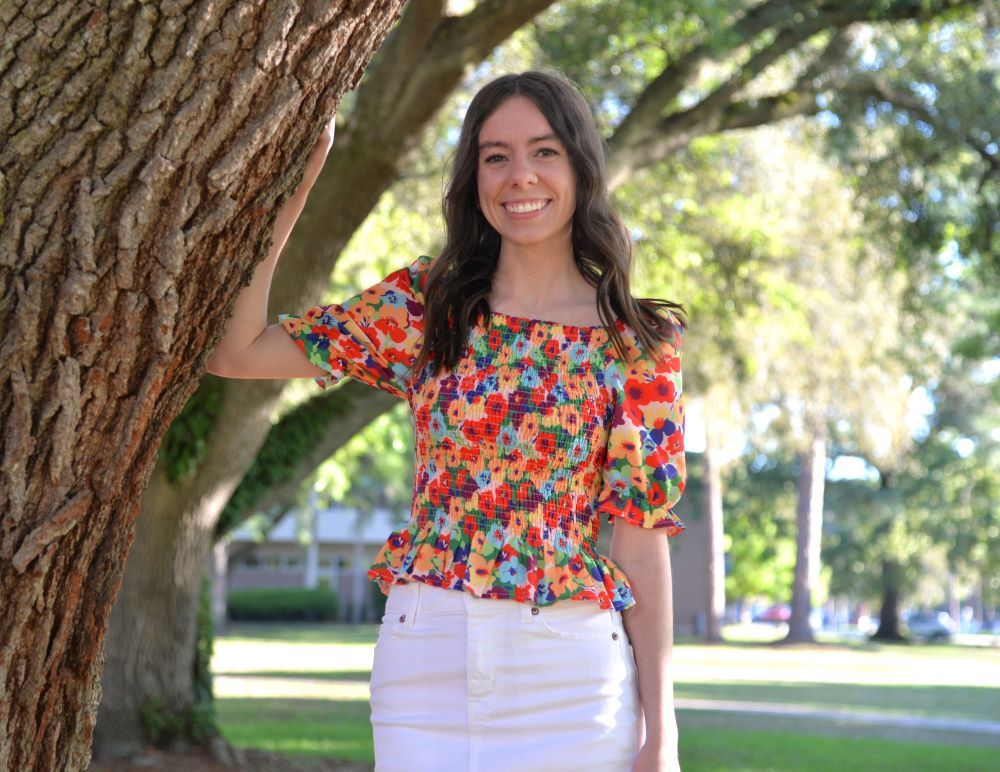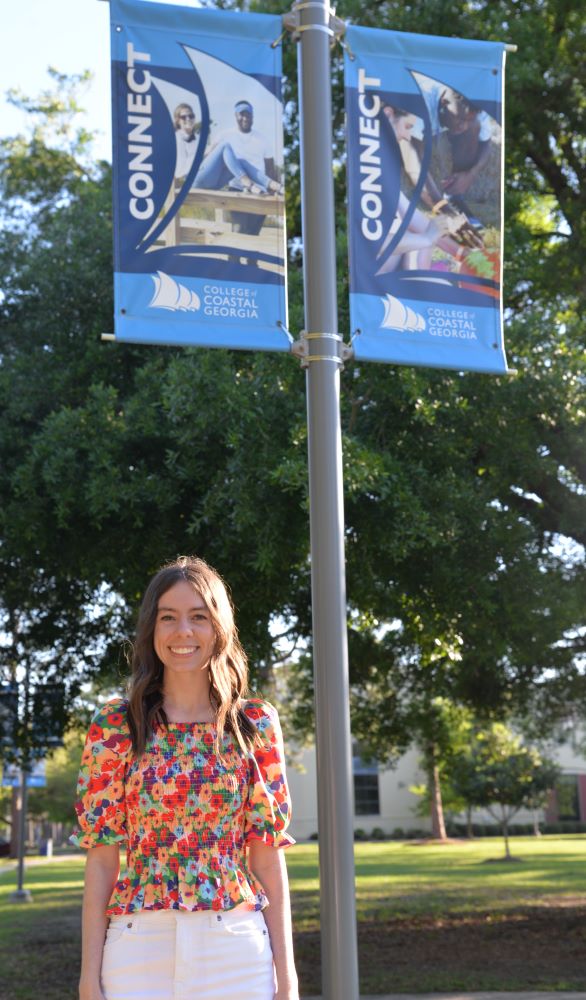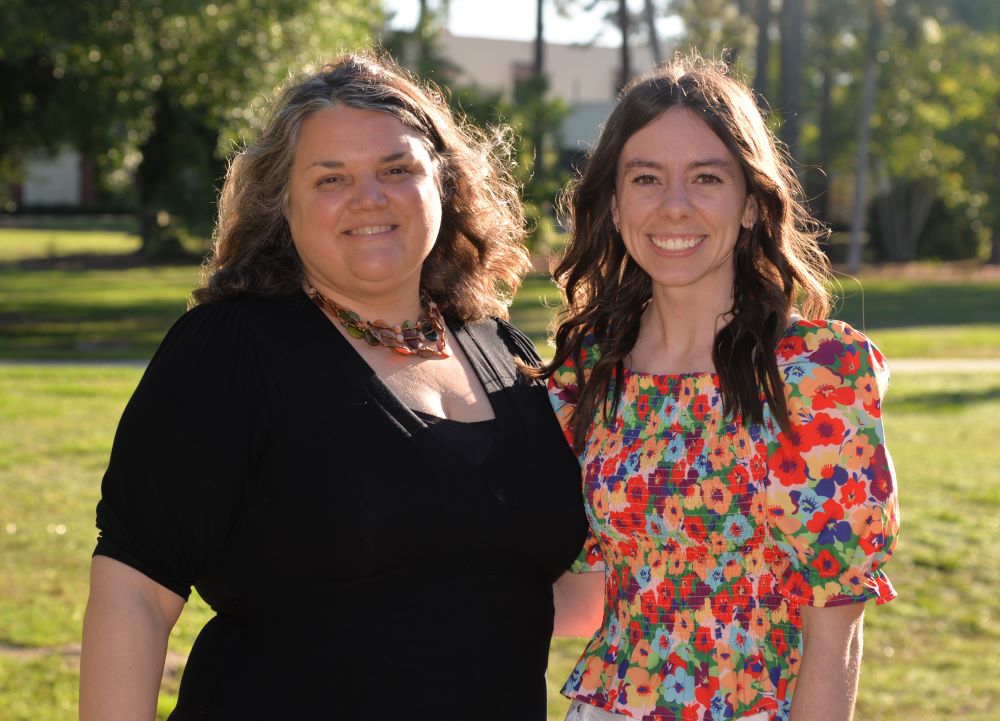
Why Not Honors?
Participating in the Honors Program at the College of Coastal Georgia was an easy decision for senior Emily Davis. When she was in middle school and high school, the McDonough native took part in her schools’ honors programs.
“When I figured out that we had one here I said, ‘I have to be a part of this.’ It’s always something I’ve loved doing,” Davis said. “I take my academics very seriously, so why wouldn’t I be a part of it?”
With that motivation, Davis will soon graduate with honors from the College, earning a bachelor’s in biology with a concentration in coastal ecology. Attending Coastal Georgia was a given for Davis. With its great ecology program and proximity to the beach, she just had to apply. Davis has always been interested in marine biology and loves anything related to the ocean. She has dreams of one day working at a marine sanctuary.
Learning Something New Through Honors
The Honors Program offers a variety of opportunities for students to approach their coursework from an honors-level perspective, and become leaders in their classrooms, on campus, and in the community. To graduate from the Honors Program, students must earn a minimum of 12 honors credits through designated honors courses, work with a faculty member to complete honors-level work within a 3000/4000 course, and complete an honors capstone project.
Although Davis loves marine life, for her capstone project, she went in a different direction. Davis worked with Dr. Tate Holbrook, professor of biology, on a project analyzing data on butterflies from the Butterflies of the Atlantic Flyway Alliance. Davis couldn’t decide what to do for her project, and Holbrook presented her with an idea.

“Dr. Holbrook emailed me and said, ‘I have a project that you can do.’ I like conservation and don’t know a lot about butterflies, so again I said, ‘Why not?’” Davis said.
That is what Professor Emily Boyle, English lecturer and director of the Honors Program, enjoys about the Honors Program.
“You can present your own project to a professor, but they can also invite you to be a part of a project they’re already doing, which may not be specifically in your field, but may contribute to it, or give you another dimension to think about,” Boyle said.
For her project, Davis studied the nectar plants and habitats used by migrating butterflies along Georgia’s Atlantic Flyway. From 2019 to 2022, nectar plant surveys were conducted across 10 BAFA sites. Eight different habitats were surveyed: brackish wetland, dune, forest, freshwater wetland, grassland, saltmarsh, shrubland, and previously developed areas, including gardens. Observers identified all flowering plants visited by several migratory butterfly species, and the data was collected by site managers and trained community scientists. Davis analyzed the data.
“I was able to sort through that and come to some conclusions about butterfly habitats and how to better conserve them,” Davis said.
The results showed that nectaring butterflies were more likely to visit plants in open habitats than in forests. The top four flowers visited were litaris (blazing star), pityopsis (silkgrass), verbesina (crownbeard), and salvia (sage). Her findings can help guide BAFA’s habitat management and restoration efforts to support butterfly populations.
Davis never did an independent research before this one. She saw it as a great opportunity to gain more research skills. Through the process, Davis improved her communication skills, learned about time management, and also realized something about herself—that she had what it takes to do research.
“I really didn’t like research and haven’t had to do much of it before, but through this project, I’ve learned that I actually enjoy it. I enjoy doing it more than I thought I would,” she said.
Davis presented a research poster about her capstone project at the recent ENDEAVOR Conference.

Why Honors?
Being a part of the Honors Program helped Davis stay accountable for her work.
“Knowing that you (Boyle) were checking in on me and looking at everything—that helped keep me accountable,” Davis said. “I’ve grown a lot academically too and in my personal skills, like communication and time management. You’re in a position to grow a lot more than if you weren’t in the Honors Program.”
Although Boyle never taught Davis in class, she was confident about Davis’ ability to complete the Honors Program.

“She always checked herself in and kept on top of the requirements for Honors, which is really self-paced,” Boyle said. “It’s so refreshing to see someone take the initiative, pace herself, and make those relationships with the professors. It’s a risk for everybody, because what if it doesn’t work? It takes courage, and she’s been awesome.”
Davis is graduating in a few days. She’s still figuring out her next steps, but one thing she is sure about is that she will miss being at the College. Some of her favorite moments include venturing out on a fish trawl with the UGA Marine Extension, taking history with Dr. Hector Montford, assistant professor of history, and statistics with Dr. Syvillia Averett, associate professor of mathematics and interim dean of the School of Arts and Sciences.
“I love how small the campus is, and being able to connect with the professors on a more personal level. Not huge class sizes, and where the professors know your name and ask how you’re doing. I’ve enjoyed that one-on-one with professors,” Davis said. “Last year was really my favorite in terms of academics because I love all the field work that the biology and environmental science program has. I loved being out of the classroom and actually out in the field doing stuff—and it’s by the beach.”
During her time at the College, Davis participated in Biology Club, now known as the Life Science Club, a photo shoot for the Office of Admissions, and served as vice president of Cheer Club. Her hobbies include going to the beach, reading, and enjoying the outdoors.